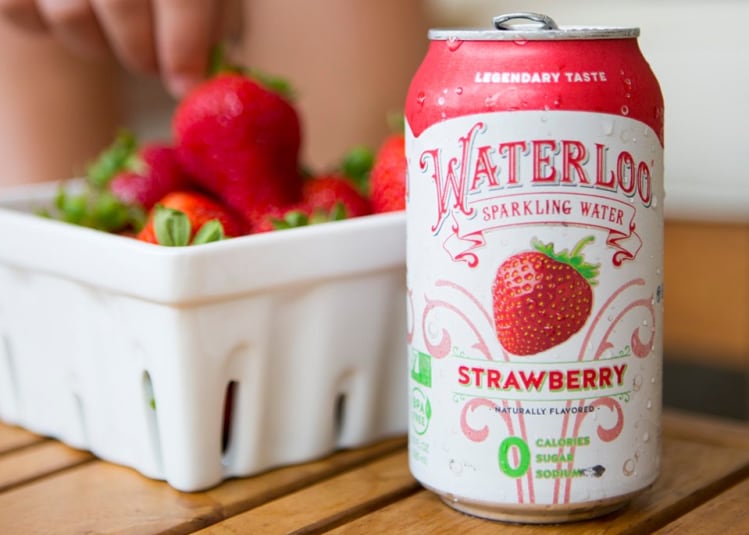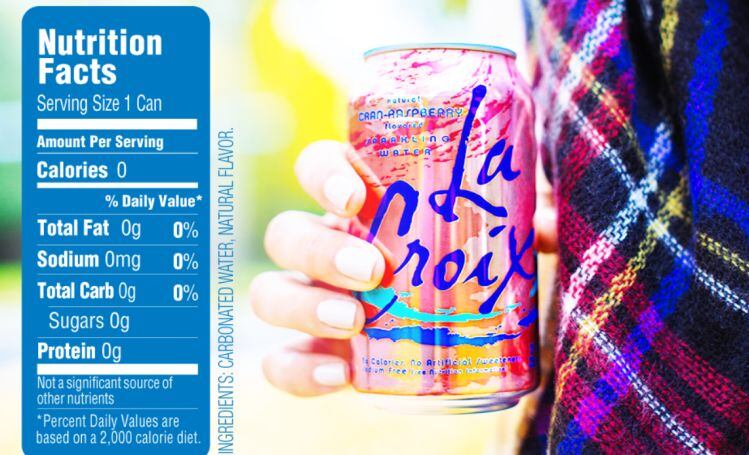In a complaint* filed in Illinois last October, plaintiff Lenora Rice alleged that LaCroix sparkling waters (which have two ingredients: carbonated water and natural flavor) are “manufactured using non-natural flavorings and synthetic compounds,” but were marketed as “always 100% natural.”
According to the lawsuit, LaCroix contains, "among other things: ethyl butanoate, limonene, linalool and linalool propionate.
“The above chemical compounds are synthetically created and added to consumable goods to make those goods taste or smell a certain way,” added Rice’s attorneys, who did not respond to our questions about how they could be sure whether the flavor components in question were ‘synthetically created’ as opposed to naturally-sourced from plants.
National Beverage Corp: 'To the extent such ingredients may be found in LaCroix sparkling water, they are found in their natural form'
LaCroix brand owner National Beverage Corp in turn, blasted the allegations as false and defamatory and insisted that, “There are no... artificial ingredients contained in, nor added to, those extracted flavors.”
In court documents filed June 28, it noted that, “to the extent such ingredients [ethyl butanoate, limonene, linalool and linalool propionate] may be found in LaCroix sparkling water, they are found in their natural form."
It added: “For each of these ingredients, National Beverage has admitted that one or more flavors of LaCroix sparkling water contain the naturally-occurring form of the ingredient."
It also pointed out that a lab report provided by the plaintiff "makes no determination" as to the natural or synthetic origins of the flavor components claimed to be in the beverages.
Trade secrets will be protected argue plaintiff’s attorneys
However, attorneys for Rice argue that National Beverage Corp should be compelled to “respond to discovery requests regarding (i) the ingredients that makeup LaCroix water, (ii) what Defendant knows about those ingredients, and (iii) who provides Defendant with those ingredients.”
The court's proposed protective order "specifically provides for the disclosure of trade secrets and other highly sensitive information via an ‘attorneys’ eyes only’ provision," claimed Rice's attorneys.
“It goes without saying that in order to prove her case, the plaintiff needs to know precisely what ingredients go into LaCroix and where those ingredients come from… This case… is not a private dispute between industry rivals or patent competitors. The court’s protective order is more than adequate to address the defendant’s trade secret concerns."
Can LaCroix be compelled to disclose trade secrets?
So can LaCroix be compelled to disclose what’s in its flavors, exactly how they were made, and by whom?
One industry source told FoodNavigator-USA: “In a case like this, it is not uncommon for a company to argue trade secrets and a plaintiff lawyer demanding disclosure in a motion to compel. The defendants typically expect they will have to produce the documents but often object due to contractual requirements to keep information confidential. However, if there is a court order requiring a company to disclose documents, that would negate any NDA provision.”
Attorney: 'Generally speaking, if there's a protective order that allows for production of info on an 'attorneys' eyes only' basis, the court will compel disclosure or issue a sanction'
Ryan Kaiser, attorney at Kaiser Lawless LLP (who does not represent any of the parties in these cases), told FoodNavigator-USA: "Generally speaking, if there is a protective order that allows for production of information on an 'attorneys' eyes only” basis (as in this case), the court will compel disclosure or issue a sanction. Courts have discretion as to the type of sanctions they may impose, ranging from monetary sanctions to judgements.

"Often, the producing party will be faced with the decision to either produce the information or be barred from introducing evidence or making arguments in support of their respective position. In this case, a sanction like that would essentially be deemed an admission that LaCroix contains synthetic ingredients. The rationale for this is sound – LaCroix won’t be allowed to use confidentiality as a sword and a shield (i.e. 'Our ingredients are all natural, but we’re not going to prove that to you because it’s confidential')."
He added: "In any case, discovery being sought must be proportional to the needs and issues of the case. By filing its complaint in the first place, Plaintiff has asserted that it either has evidence to prove its case, or reasonably believes it will be able to prove the case after discovery. Defendant might make an argument that Plaintiff should first be required to establish that there are indeed synthetic ingredients in the product before the court should consider compelling disclosure of trade secrets.
"However, from reading Plaintiff’s brief it looks like they did indeed test the product and have at least some threshold evidence suggesting there are synthetics in the product. That, combined with the fact that the Court has apparently already suggested and Ordered “Attorneys’ Eyes Only” protection for trade secret information, leads me to believe the Court is going to side with Plaintiff on this motion."
Attorney: ‘Natural flavors are on the radar for scrutiny’
According to flavor industry sources contacted by FoodNavigator-USA, the four flavoring substances identified in the complaint are naturally occurring and could be produced in a manner that could be consistent with FDA’s definition of natural flavor at 21 CFR 101.22(a)(3) although they can also be produced synthetically.
At the heart of the issue, then, is how you can tell.
In a second lawsuit** filed vs LaCroix in New York on Jan 29, for example, the plaintiffs allege that third party testing from The Center for Applied Isotope Studies (CAIS) at the University of Georgia can determine whether such ingredients are synthetically-derived.
Speaking to FoodNavigator-USA when the cases were originally filed, Wendel, Rosen, Black & Dean partner William Acevedo said: “I think that it is fair to say that natural flavors are on the radar for scrutiny. It’s a foreseeable offshoot of the ‘All Natural’ complaints, and I think that plaintiff’s attorneys are drilling down ever deeper into labels and ingredient lists to find infractions.
“While suppliers often guard their natural flavors formulations as proprietary information, the prudent manufacturer should insist on a written representation that a natural flavor does not contain any synthetic sub-ingredient from the supplier before it makes any ‘natural’ claim.
* Lenora Rice et al v National Beverage Corp d/b/a LaCroix Sparkling Waters. Case # 1:18-cv-07151 filed in Cook County Illinois. The plaintiff - who is represented by law firm Beaumont Costales LLC - alleges violations of the Illinois Consumer Fraud Act, breach of express warranties, and unjust enrichment, and seeks to represent a class comprising all individuals in Illinois who purchased LaCroix water in the last four years.
**Adenike Graham and Kimberly McNulty et al v. National Beverage Corporation 1:19-cv-00873 filed in the southern district of New York on January 29, 2019. The plaintiffs allege violations of New York’s Unfair and Deceptive Trade Practices Act, breach of contract/common law warranty, and unjust enrichment. They are represented by Simmons Hanly Conroy LLC, Greg Coleman Law PC, Barbat, Mansour & Suciu PLLC, and Bruca Law, PLLC




